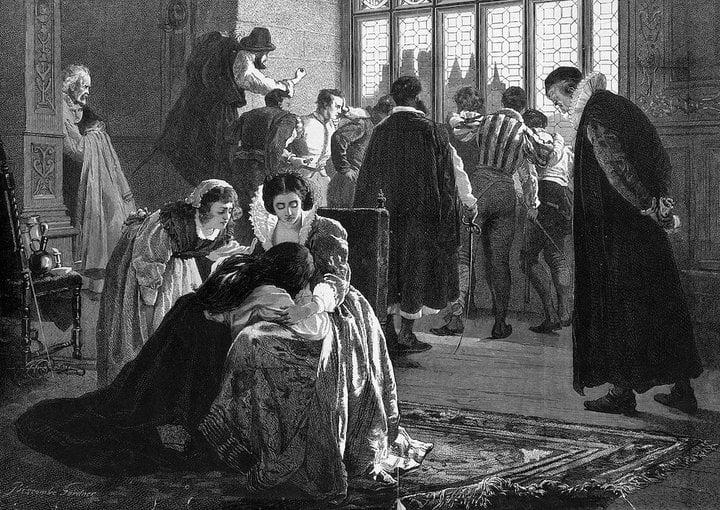How history repeats itself
Picture this. A whole section of the actual population of a country is targetted inside its own capital. It's Paris on 24th August 1572, and Sir Francis Walsingham is the English ambassador to France then and would later on become Queen Elizabeth I’s principal secretary and spymaster. Even Sir Francis had been taken by surprise by the massacre, yet his house was held the whole week by miracle inviolable. The house of the ambassador laid in a Paris suburb where many French Protestants (Huguenots), the people who were targetted, had their own homes, but for much of the mass killing it had been protected by a ring of loyal embassy staff and royal troops.
Thus, during this later on so-called St. Bartholomew's Day massacre, the English embassy served as a refuge for some Englishmen but also many Frenchmen fleeing the street violence. A French nobleman, François de Beauvais, Seigneur de Briquemault, played a crucial role in sheltering individuals within the English embassy and providing further protection of royal troops. He, along with others, sought refuge in the embassy after witnessing the vicious violence himself and losing his own son in the indiscriminate attacks and plunderings. Briquemault even disguised himself as a butcher to reach the embassy, highlighting the desperation and danger of the situation.
In the letter Sir Francis later wrote, still upon these terrible happenings, to his supperiors in London he reported in fairly neutral tones what both the King Charles IX and the Queen Mother, Catherine de' Medici, declared, that a Huguenot conspiracy had forced them to act. Yet the draft for the letter shows one passage of real anger. Sir Francis raised the issue that three Englishmen had been murdered and many others plundered during the general massacre. When the King promised to punish the guilty if they could be found, Sir Francis replied that this would be hard to do, ‘the dysorder beinge so generall, the swoorde being commytted to the common people’. This in itself was an astonishingly blunt thing to say to any king, that he had let his God-given sword of justice and authority fall into the hands of the mob.
One can but think of present day similar conflicts where nationals have been so blindly killed and their property been destroyed. The king's empty promises sound ever so familiar in this context. When a state drops the God-given sword so into the gutter there's no real salvation any more left. As for François de Beauvais, he got arrested, delivered to the French parlement, and failed only in courage when confronted with his judges, seeking to escape death and confiscation of his family's property. He was condemned, nevertheless, and on 29th October 1572, he was excecuted. Only five years later, in an effort to appease the situation, King Henry III rehabilitated the memory of François de Beauvais de Briquemault by means of an authentic act. His grandson Jean retained only the surname Briquemault
Thus, during this later on so-called St. Bartholomew's Day massacre, the English embassy served as a refuge for some Englishmen but also many Frenchmen fleeing the street violence. A French nobleman, François de Beauvais, Seigneur de Briquemault, played a crucial role in sheltering individuals within the English embassy and providing further protection of royal troops. He, along with others, sought refuge in the embassy after witnessing the vicious violence himself and losing his own son in the indiscriminate attacks and plunderings. Briquemault even disguised himself as a butcher to reach the embassy, highlighting the desperation and danger of the situation.
In the letter Sir Francis later wrote, still upon these terrible happenings, to his supperiors in London he reported in fairly neutral tones what both the King Charles IX and the Queen Mother, Catherine de' Medici, declared, that a Huguenot conspiracy had forced them to act. Yet the draft for the letter shows one passage of real anger. Sir Francis raised the issue that three Englishmen had been murdered and many others plundered during the general massacre. When the King promised to punish the guilty if they could be found, Sir Francis replied that this would be hard to do, ‘the dysorder beinge so generall, the swoorde being commytted to the common people’. This in itself was an astonishingly blunt thing to say to any king, that he had let his God-given sword of justice and authority fall into the hands of the mob.
One can but think of present day similar conflicts where nationals have been so blindly killed and their property been destroyed. The king's empty promises sound ever so familiar in this context. When a state drops the God-given sword so into the gutter there's no real salvation any more left. As for François de Beauvais, he got arrested, delivered to the French parlement, and failed only in courage when confronted with his judges, seeking to escape death and confiscation of his family's property. He was condemned, nevertheless, and on 29th October 1572, he was excecuted. Only five years later, in an effort to appease the situation, King Henry III rehabilitated the memory of François de Beauvais de Briquemault by means of an authentic act. His grandson Jean retained only the surname Briquemault






